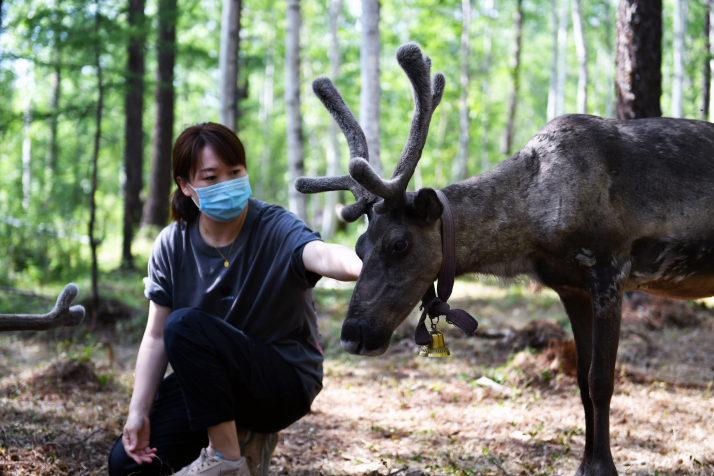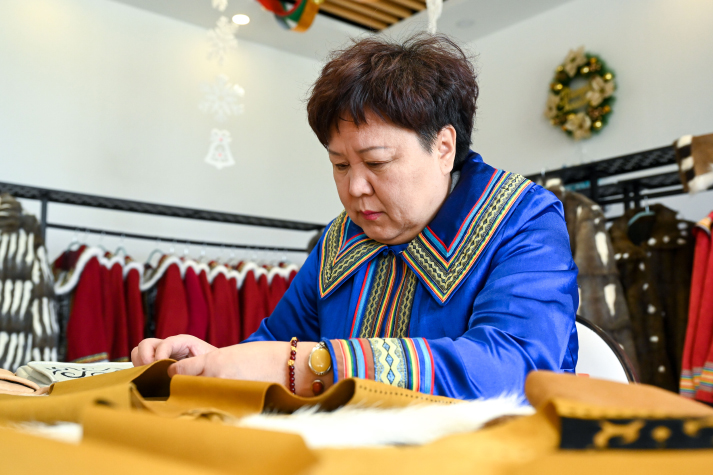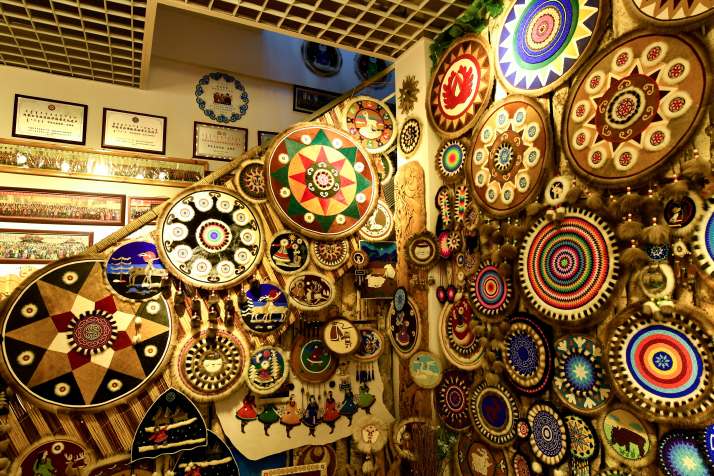|
||||||
|
||||||
| Home Nation World Business Opinion Lifestyle China Focus ChinAfrica Video Multimedia Columnists Documents Special Reports |
|
||||||
|
||||||
| Home Nation World Business Opinion Lifestyle China Focus ChinAfrica Video Multimedia Columnists Documents Special Reports |
| Nation |
| Sole reindeer-breeding community explores new way of life after relocation from mountains |
| By Ji Jing · 2020-08-17 · Source: NO.34 AUGUST 20, 2020 |
 A tourist pats a reindeer at a farm in Genhe, Inner Mongolia Autonomous Region in north China, on July 13 (XINHUA)
Outside rows of double-storied brown wood houses, the elders are enjoying their tea while inside, the women are busy baking bread or making traditional handicrafts. Zhongnihao is one of the elders. These members of the Ewenki ethnic group, also known as "the last hunting tribe of China," are living a different life from that which they left behind.
Zhongnihao, 79, is happy to have come down from the mountains in Inner Mongolia Autonomous Region in the north, where they lived mostly by hunting. He remembers the freezing winters when they had difficulty getting adequate food and water. But now, in their new houses in Genhe in Inner Mongolia, built by the government, they have central heating and running water.  Dekeli, a businesswoman in Genhe, Inner Mongolia, makes Ewenki-style clothes in her workshop on May 31 (XINHUA)
Farewell to the mountains
Ewenki means people living in the mountains. With a population of less than 40,000, it is one of the smallest ethnic minorities in China. The Ewenkis mostly lived as hunters in the Greater Hinggan Mountains, which are home to the largest primitive forest in China straddling Inner Mongolia and Heilongjiang Province in the northeast. Before the founding of the People's Republic of China (PRC) in 1949, the Ewenkis led a primitive life in isolation. They wore animal skins and lived in huts made of wooden poles thatched with birch bark. In 1958, the first Ewenki township was established in Erguna, a city in Inner Mongolia, marking the ethnic group's first step toward modernization. In 2003, over 200 hunters moved from the forest into the new wooden buildings near Genhe. As the new houses are in an urban area, the migrants have more job and other income opportunities. To help them settle in, the government issued supportive policies including addressing their education and medical care needs. On his farm in Genhe, Gumusen, a young Ewenki herder, is tending to his reindeer. He is fumigating the area to drive away the pesky mosquitoes. There were worries that the Ewenkis would not be able to continue with their traditional livelihood of raising reindeer once they moved out of the mountains. However, the local government came to the rescue of the relocatees, putting in 100 million yuan ($14.4 million) to develop tourism based on the unique reindeer-raising culture. The government also gave the herders vans to make the translocation easier. The vans come with solar panels that can power refrigerators and TV sets. In addition, the herders are sent daily necessities regularly to help them out. Some of the relocatees are running shops selling reindeer products and hostels. Gumusen said during the peak tourism season, he can make over 1,000 yuan ($144) a day by selling reindeer products. The per-capita annual income of former Ewenki hunters has increased from 1,277 yuan ($183.6) in 2005 to 20,000 yuan ($2,876) at present and the number of reindeer risen from about 100 before the relocation to nearly 1,000. The Ewenkis' average life expectancy has improved from 43 in the early years of the PRC to 75. There are over 100 Ewenkis aged above 80.  A workshop in the traditional culture industrial park in Ewenki Autonomous Banner, Inner Mongolia, on December 16, 2019 (XINHUA)
A unique culture Dekeli, who lives in Hulun Buir, another city in Inner Mongolia, runs a workshop that makes traditional Ewenki clothes, eye-catching totems made of painted reindeer skin, and other traditional handicrafts. Since the Ewenkis don't have a written language, the totems play an important role in providing signs for communication and are used in rituals like burials. "We have done over 100 totem paintings and plan to compile them into a book to pass down to the younger generation," Dekeli told Xinhua News Agency. Many young people are engaged in the workshop, giving a new vitality to traditional handicrafts. As the Ewenkis used to live in the dark and cold forest, they love the sun. Accessories made of fur and colored stones shaped like the sunflower are an important cultural symbol. They are also among the products Wuren, who runs a homestay in Ewenki Autonomous Banner administered by Hulun Buir, sells to expand her business. When she started the homestay in 2005, Wuren would wear sunflower accessories to receive tourists and she found the visitors showing a lot of interest in them. "So I thought, why not make some sunflower accessories to sell? By doing so, I can not only increase my income but also spread the Ewenki culture," she told Cnr.cn. The traditional accessories are providing jobs today. In 2010, Wuren started a workshop with an investment of 600,000 yuan ($86,400), hiring six women from impoverished families. "I provided them with the raw materials and they made the accessories at home, so that they could also take care of their families and the cattle and sheep at the same time," she said. In the beginning, they made accessories with simple patterns. But now, with the business picking up, the designs have been innovated, becoming more ornate. The sunflower design is used in a wide range of products such as earrings, fridge magnets and mouse pads. In 2016, Wuren was recognized as an inheritor of the intangible cultural heritage of the Ewenki ethnic group by the Inner Mongolia Regional Government. To support the development of traditional culture, a traditional culture industrial park was built in Ewenki Autonomous Banner in 2016. Wuren moved her business to the park that year. Today, it has 14 employees, five of whom come from impoverished families. There are over 100 intangible cultural heritage inheritors and entrepreneurs based in the park. Wuren's daughter Aijima, who majored in computer science, returned home after she finished her university education to help her mother sell the sunflower items on e-commerce platforms. Every year, they get over 10,000 orders from across the country. "Traditional culture is very popular. I want to add a new dimension to the sunflower culture through constant innovation," Aijima told Xinhua. (Print Edition Title: From Herder to Hosteler ) Copyedited by Sudeshna Sarkar Comments to jjing@bjreview.com |
About Us | Contact Us | Advertise with Us | Subscribe
|
||
| Copyright Beijing Review All rights reserved 京ICP备08005356号 京公网安备110102005860号 |